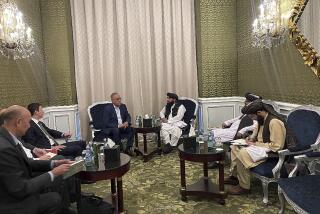Talking to the Taliban
The Taliban’s on-again, off-again approach to negotiations on a political settlement appears to be on again. Or so it seems from the announcement that it will open an office in Qatar to have a secure “address” (this seems to be the prevailing diplomatic term of art) from which it can participate in talks.
Even those optimistic about the prospects for a deal robust enough to actually end the war in Afghanistan are treading warily, lacing prognostications with caveats. And rightly so in light of what has happened in the past.
In November 2010, for example, an impostor posing as a top Taliban emissary seeking to initiate a peace process with the Afghan government purloined a huge stash of cash earmarked to grease the skids and get things moving. Less than a year later, Burhanuddin Rabbani, a prominent Tajik leader, former anti-Soviet guerrilla, Afghan president during a part of the 1990s and the head of a committee appointed by Afghan President Hamid Karzai to initiate talks with the Taliban, was blown up by a visitor who concealed a bomb in his turban. Police said the visitor claimed to be carrying a message from the Taliban.
Apart from the uncertainty about the Taliban’s commitment, the ambivalence — and even opposition — of other interested parties clouds the prospects for serious peace talks. Pakistan worries that the United States might cut a deal with the Taliban that gives short shrift to Pakistani interests (which, above all, involve minimizing India’s influence in Afghanistan) and reduces the advantages Islamabad has by virtue of its special contacts with the Taliban leadership.
The Tajiks in Afghanistan (the largest ethnic group after the Pashtuns, the Taliban’s base) revile the Taliban, having fought them intermittently from 1996 to 2001 in an effort to prevent their northern redoubts from being conquered. The Tajiks were the leading edge of the Northern Alliance, which the United States teamed up with to bring down the Taliban regime after the 9/11 attacks. For most Tajiks, especially Amrullah Saleh, Karzai’s intelligence chief from 2004 to 2010 and an outspoken opponent of negotiations, the only good Taliban may be a dead one.
Then there’s Karzai, a Pashtun, who was initially opposed to giving the Taliban a perch in Qatar and who, rightly, sees America’s interest in negotiating with the Taliban — whose leaders want to deal directly with the U.S., not the government in Kabul — as evidence of war fatigue. His question: Will the Americans reach a face-saving accord and leave me to deal with the Taliban?
But the talks are likely to proceed, albeit with uncertain results, because of a convergence of interests between the Obama administration and the Taliban.
President Obama has insisted that the conflict in Afghanistan has no military solution. His rationale for the 2009 surge that added 30,000 troops was that the Taliban had to be squeezed before its leaders would negotiate in good faith, and in ways that would bring good results for the United States. Since then, he has set out to diminish America’s military role: 10,000 troops were withdrawn in late 2011, an additional 23,000 are to return home by the fall of 2012, and the president wants all major combat operations terminated before the end of 2014.
But U.S. hawks have lambasted Obama’s disengagement, claiming that it will reverse the gains of the surge, demoralize Afghans and convince the Taliban that victory is nigh. Given the election season, the anti-exit vitriol will increase, and Obama needs political cover. Hence the value of being able to show that the Taliban has in fact been battered enough to bargain and that the withdrawal is proceeding under prudent and honorable circumstances.
For its part, the Taliban has suffered serious losses, in fighters and territory, because of the surge and the stepped-up drone attacks on its strongholds. Though adept at replenishing its ranks and devising new tactics (bombings, assassinations and focusing operations in areas lacking U.S. forces), the Taliban could use a respite. More important, the Taliban believes that the talks will sow doubts in Afghanistan about America’s staying power, thus giving it a psychological edge.
True, the Taliban has said in the past that it won’t negotiate until foreign troops depart. But it can spin the talks as a win by boasting that the United States was forced to bargain because, despite U.S. military might, the Taliban proved invincible. Moreover, the Taliban and Obama have this much in common: Both want a reduction in American forces, albeit for very different reasons. A cessation — even a diminution — of the war makes it more likely that Obama can implement his timetable.
The Taliban’s adage has been that the Americans have the watches but it has the time. Its leaders know that the insurgency lacks the muscle to defeat the U.S. troops. But that has never been the Taliban’s strategy. Its plan all along has been to persist till war weariness and the weakening of allied support nudge the United States toward the exits.
So there’s no distinction between war and peace in the Taliban’s mind. The new address in Qatar is not a case of the Taliban crying uncle; it’s a new phase in a long struggle.
Rajan Menon is a professor of international relations at Lehigh University.
More to Read
A cure for the common opinion
Get thought-provoking perspectives with our weekly newsletter.
You may occasionally receive promotional content from the Los Angeles Times.










